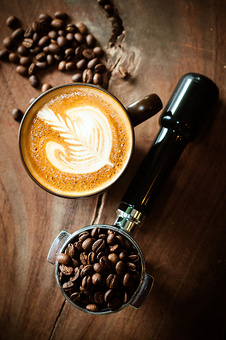Coffee shop management, good business is not "saved".
Follow the caf é (Wechat official account vdailycom) and found that Beautiful Cafe opened a small shop of its own.
Whenever I talk about business issues, I always think of an interesting story around me:
On the last day of the construction phase of a bar decorated by a friend, the boss looked at Linglang's rich decoration and said to others, "I like to watch the construction site gradually become what I imagined it to be!" In fact, I am not interested in how to run the business at all, ! "
Later found that, in fact, many owners like to "open a shop" this thing, for "management" two words have no feeling, often stroll to the "big chest and brainless" storefront really can not help a sigh!
What happens after the store is opened is the real skill, and among the various business traps of touching stones and crossing the river, the most criticized by the market is the word "saving money".

The idea of "saving money" usually appears after embarrassing business statements, and this is also the time when operators are most tested. Operators who lose their temper often choose to light a cigarette, gnash their teeth and stamp their feet. Hurriedly summon core members to study the issue of "cutting expenditure". Rent is a dead cost, decoration has already been spent, and equipment can never be sold, so the so-called "cost savings" often look in these directions:
First, save labor costs!
Oh, God! Coffee buddies have been very bitter. But the reality is that the smaller the store, the higher the proportion of personnel costs in terms of economic accounting. The worst "cost-saving" is nothing more than starting from the wages and benefits of employees, resulting in a lack of unity, loss of personnel, decline in service quality, unguaranteed product quality, and a vicious circle over and over again.
An operator once asked me seriously: "do you want to find more part-time jobs to save costs?" Personally, I am very opposed to this, because small and medium-sized coffee shops, especially small and medium-sized coffee shops, are always a place full of "human feelings". Every now and then fresh faces come to serve regular customers, and it is difficult to maintain their emotions. it also makes people feel like "spending money as a guinea pig". Moreover, it seems that wages have been saved, in which the cost of training (including the cost of time) is already an incalculable account.
Second, save material cost!
Whenever a customer asks me repeatedly, "is there any cheaper coffee beans available", I feel vaguely that something bad is going on in this store.
I am afraid that there will be such seeds in the minds of operators: first, my customers are not picky about their products, and they cannot tell whether they are good or bad; second, there must be cheaper materials to complete the existing products.
If the core word "coffee" for a cafe can survive, will consumers expect the shop to offer exquisite desserts without additions? Animal cream with better health and taste? Work hard to improve the meat in the hamburger? A takeout cup that provides a higher aesthetic and design sense? Replace filter element and check water quality regularly as required.
Stop dreaming.
"both can be better" and "both can be more comfortable". These two business ideas are like "1.1 to the 10th power" and "0.9 to the 10th power". They have been judged over the years.
Third, save operating costs!
"the waiter would like to turn on the air conditioner, it's cold."
"Hello, the air conditioner is on." (but not enough to reach the right temperature)
"A suggestion from the waiter is that your toilet smells too bad."
"Hello, we cleaned this morning." (maybe an automatic incense sprayer can solve the problem.)
"waiter, don't you have hot water to wash your hands?"
"Sorry, the hot water treasure broke last week." (actually, it's because the boss thinks it consumes too much electricity.)
In finding these details, I am afraid the employees will complain every day. If the boss were a customer, would he like this store?
I hope none of the above has happened in your store.
If so, please understand that your boss, manager, or partner may not be looking in the right direction for the time being. As an operator, no one else knows more about your store's advantages, and there are too many things to think about, including:
Is there a problem with business hours?
Is there a revenue gap in a certain period of time?
Is it possible for the existing team to create other profit points?
How many quality customers in the business circle do not know the existence of this store at all?
What kind of membership mechanism is most likely to avoid the loss of old members?
Can offline activities bring the flow of people or business income to the store?
A new festival is coming. Are you ready?
Is takeout coffee worth making?
……
"strengthen the advantage" & "appropriate open source", and these are the hope of team vitality and store development. Coffee shop management, good business is definitely not "save" out, for the coffee dream of a cavity of blood, do not use the wrong direction.
[related reading]
Brief introduction of Brazilian Coffee
Brazilian coffee generally refers to coffee produced in Brazil. There are many kinds of coffee in Brazil, and like other Arabica coffee, Brazilian coffee is called "Brazils" to distinguish it from "Milds" coffee. The vast majority of Brazilian coffee is unwashed and sun-dried and is classified according to the name of the state of origin and port of transport. Brazil has 21 states, 17 of which produce coffee, but four of them produce the largest, accounting for 98 per cent of Brazil's total output: Parana, SaoPaulo, MinasGerais and EspiritoSanto, with the southern state producing the most, accounting for 50 per cent of total production.
Brazil is vividly compared to the "giant" and "monarch" of the coffee world. There are about 3.97 billion coffee trees there, and small farmers now grow 75% of Brazil's total coffee production. The number of coffee producers in Brazil is twice or even three times that of Colombia, the second largest coffee producer in the world.
Unlike in the past, Brazil's economy is now less dependent on coffee, which accounts for only 8% to 10% of GDP. Before World War II, Brazil accounted for 50% or more of the world's coffee production, and now it is close to 30%. But the country's impact on the world's coffee, especially on coffee prices, is significant. For example, two frost disasters in 1994 caused a sharp rise in global coffee prices.
Since the introduction of coffee trees from French Guiana (Guyana) in 1720, coffee production has gradually become a science. Before 1990, the Brazilian government carried out strict monitoring of the coffee industry, with both strict intervention and price protection measures, and the state has been implementing minimum price protection measures for farmers, resulting in coffee overproduction. Before World War II, the remaining stock reached 78 million bags, which had to be burned by fire or thrown into the water to destroy.
Since the opening of the free market in 1990, the original Brazilian Coffee Authority (IBC) has been replaced by the National Economic Association, the country's non-investment administrative body, which pursues a policy of non-intervention and allows producers to negotiate directly with exporters. The business activities of exporters are supervised by the government legislation, and the relevant departments register legitimate exporters.
Types of Brazilian coffee
Although coffee is diverse, Brazilian coffee is suitable for the taste of the public. For example, coffee produced in the northern coastal areas has a typical iodine taste, reminiscent of the sea after drinking. This coffee is exported to North America, the Middle East and Eastern Europe. Another kind of coffee that is interesting and worth looking for is washed Bahia. This kind of coffee is not easy to find because Brazil is the world's largest consumer of coffee after the United States, and many of the best coffee can only be found in its domestic market.
In Brazil, the largest producer is Robbins. This kind of coffee is sold in the supermarket. Brazil's Robucht coffee, sold under the name Conillon, accounts for 15 per cent of total production.
Old bourbon coffee is grown on some estates in the Serrado district of MinasGreais in southeastern Brazil. These estates, such as Caping Blanco (CapinBranco) and Vista Allegre (VistaAllegre), grow old varieties of bourbon coffee on the market. Although they come from the same area, these coffees have their own characteristics. Capingblanco coffee is smoother than Vesta Allegre coffee, while Vesta Allegre coffee is strong and black, both of which have lower acidity. However, like all Brazilian coffee, they are most suitable for drinking when they are fresh and tender, because the older they are, the more acidic they are. These coffee growers have organized themselves into the Brazilian Special Coffee Association (the Speciality Coffee Association of Brazil).
Important Notice :
前街咖啡 FrontStreet Coffee has moved to new addredd:
FrontStreet Coffee Address: 315,Donghua East Road,GuangZhou
Tel:020 38364473
- Prev

How to run a coffee shop to achieve maximum profit
With the increasing openness of Chinese policy, more and more imports are introduced into China, including coffee. This natural product, which has gone through hundreds of years, has changed history and creator history with its silent tenderness and unique fragrance. Today, when coffee is no longer the enjoyment of the aristocracy, it has once again become the darling of investors with its civilian but noble demeanor.
- Next

How to run a cafe, a good state of mind and work preparation are essential.
I don't think there are several types of people who can do a good job in cafes with these mindsets. Those who have made some money in other industries casually take over a seemingly well-run cafe, thinking that they are run by the store manager and act as shopkeepers on their own, and their chances of failure are quite high. Don't treat the cafe as a catering business. The boss needs to manage everything. The end of 02
Related
- What documents do you need to go through to open a coffee shop? coffee shop coffee shop certificate processing process
- How to purchase Coffee beans in small Cafe how to choose a suitable supplier for domestic Coffee supply Company
- How to drink Starbucks Fragrance White Coffee? how to make Australian White Coffee? what Italian coffee beans are recommended?
- The Story of Flora Coffee: the name of Flora Coffee Bean and the implication of the Flowers on Florna Coffee
- How much does a cup of coffee cost? How much is the profit of a cup of coffee? What is the profit of the coffee shop in a year?
- Yunnan small Coffee, known as "fragrant Coffee", introduces the characteristics of Alpine Arabica Coffee producing areas in Yunnan, China
- 2023 latest Starbucks full menu price list how much is a cup of Starbucks coffee what is better to drink the most popular hot and cold drinks recommended
- Starbucks different kinds of Coffee Price list Starbucks menu 2023 Top Ten Best drinks in Starbucks
- Starbucks Spring praise Comprehensive matching Coffee Bean theme Story Packaging implication and taste description
- The cost of a cup of coffee latte American coffee cost price and selling price

